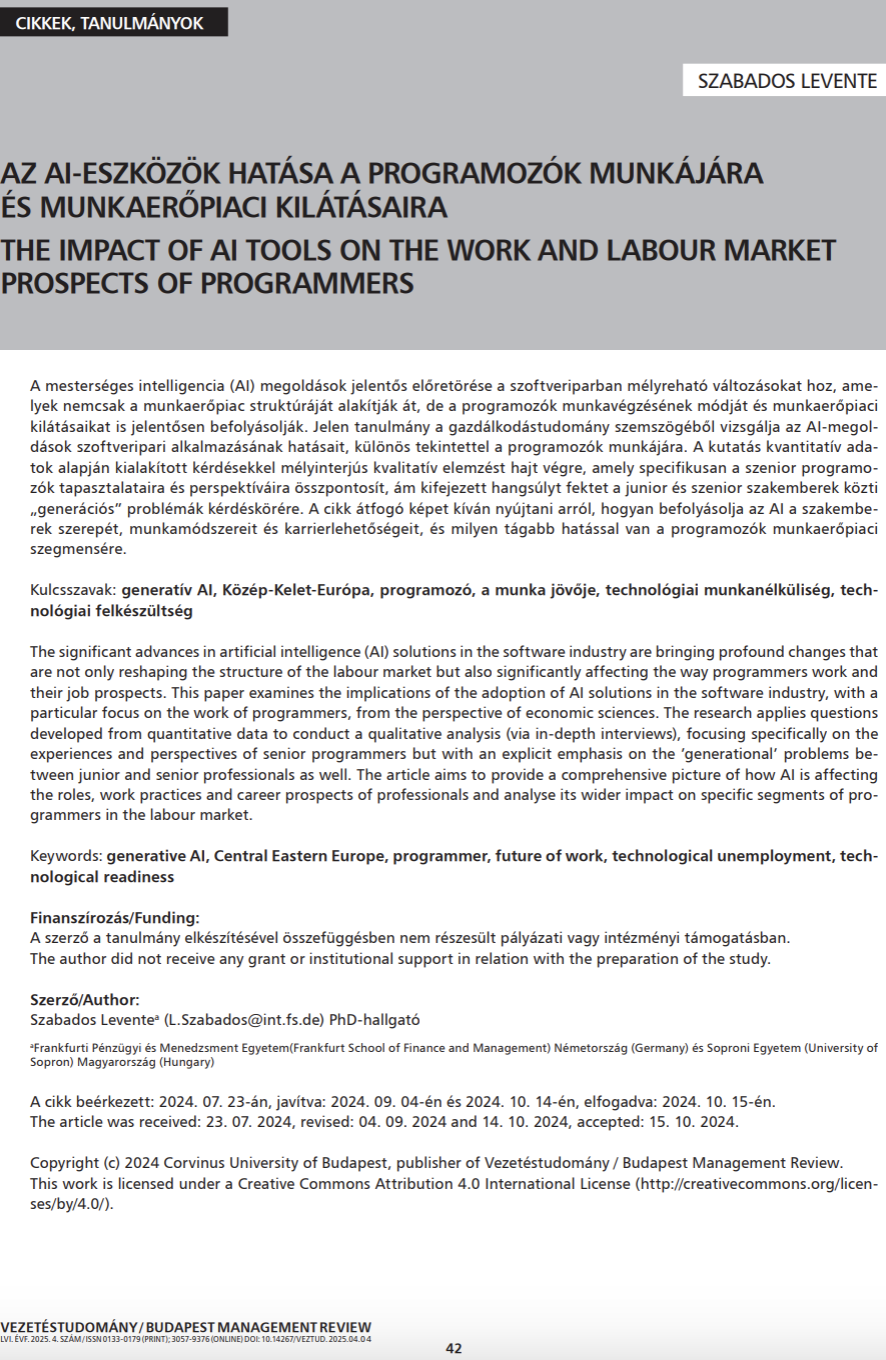Az AI-eszközök hatása a programozók munkájára és munkaerőpiaci kilátásaira
DOI:
https://doi.org/10.14267/VEZTUD.2025.04.04Kulcsszavak:
generatív AI, Közép-Kelet-Európa, programozó, a munka jövője, technológiai munkanélküliség, technológiai felkészültségAbsztrakt
A mesterséges intelligencia (AI) megoldások jelentős előretörése a szoftveriparban mélyreható változásokat hoz, amelyek nemcsak a munkaerőpiac struktúráját alakítják át, de a programozók munkavégzésének módját és munkaerőpiaci kilátásaikat is jelentősen befolyásolják. Jelen tanulmány a gazdálkodástudomány szemszögéből vizsgálja az AI-megoldások szoftveripari alkalmazásának hatásait, különös tekintettel a programozók munkájára. A kutatás kvantitatív adatok alapján kialakított kérdésekkel mélyinterjús kvalitatív elemzést hajt végre, amely specifikusan a szenior programozók tapasztalataira és perspektíváira összpontosít, ám kifejezett hangsúlyt fektet a junior és szenior szakemberek közti „generációs” problémák kérdéskörére. A cikk átfogó képet kíván nyújtani arról, hogyan befolyásolja az AI a szakemberek szerepét, munkamódszereit és karrierlehetőségeit, és milyen tágabb hatással van a programozók munkaerőpiaci szegmensére.
Letöltések
Hivatkozások
Agrawal, A., Gans, J., & Goldfarb, A. (2018). Prediction machines: The simple economics of artificial intelligence. Harvard Business Review Press.
Agrawal, A., Gans, J., & Goldfarb, A. (2022). Power and prediction: The disruptive economics of artificial intelligence. Harvard Business Review Press.
Bessen J.E. (2017) AI and jobs: The role of demand. (NBER Working Paper No. 24235). National Bureau of Economic Research. https://doi.org/10.3386/w24235
Bommasani, R., Hudson, D.A., Adeli, E., Altman, R., Arora, S., von Arx, S., Bernstein, M.S., Bohg, J., Bosselut, A., Brunskill, E., Brynjolfsson, E., Buch, S., Card, D., Castellon, R., Chatterji, N., Chen, A., Creel, K., Davis, J. Q., Demszky, D., … Liang, P. (2022). On the opportunities and risks of foundation models. arXiv. https://doi.org/10.48550/arXiv.2108.07258
Brauner P., Hick A., Philipsen R., & Ziefle M. (2023). What does the public think about artificial intelligence? — A criticality map to understand bias in the public perception of AI. Frontiers of Computer Science, 5, 1113903. https://doi.org/10.3389/fcomp.2023.1113903
Bughin J., Seong J., Manyika J., Chui M., & Joshi R. (2018). Notes from the AI frontier: Modeling the impact of AI on the world economy. Discussion paper. McKinsey Global Institute. https://www.mckinsey.com/~/media/McKinsey/Featured%20Insights/Artificial%20Intelligence/Notes%20from%20the%20frontier%20Modeling%20the%20impact%20of%20AI%20on%20the%20world%20economy/MGI-Notes-from-the-AIfrontier-Modeling-the-impact-of-AI-on-the-worldeconomy-September-2018.ashx
Dechter, R. (1986). Learning while searching in constraint- satisfaction-problems. In Proceedings of the AAAI Conference on Artificial Intelligence (pp. 178- 183). ACM. https://dl.acm.org/doi/abs/10.5555/2887770.2887799
DeepMind (2024). Gemini v1.5: Technical report. https://deepmind.google/technologies/gemini/
Dell’Acqua, F., Rajendran, S., McFowland, E., Krayer, L., Mollick, E., Candelon, F., Lifshitz-Assaf, H., Lakhani, K., & Kellogg C. (2023). Navigating the jagged technological frontier: Field experimental evidence of the effects of AI on knowledge worker productivity and quality. Harvard Business School Technology & Operations Mgt. Unit Working Paper No. 24-013. The Wharton School Research Paper. https://doi.org/10.2139/ssrn.4573321
Developer Nation. (2024). State of the developer nation 26th edition: Developer trends for Q3 2024. https://www.developernation.net/developer-reports/dn26/
Felten, E.W., Raj, M., & Seamans, R. (2019). The occupational impact of artificial intelligence: Labor, skills, and polarization. Technical report. NYU Stern School of Business. https://dx.doi.org/10.2139/ssrn.3368605
Felten, E, Raj, M., & Seamans, R. (2021). Occupational, industry, and geographic exposure to artificial intelligence: A novel dataset and its potential uses. Strategic Management Journal 42(12), 2195–2217. https://doi.org/10.1002/smj.3286
Fradkov, A.L. (2020). Early history of machine learning. IFAC-PapersOnLine, 53(2), 1385–1390. https://doi.org/10.1016%2Fj.ifacol.2020.12.1888
Galster, M., Mitrovic, A., Malinen, S., & Holland, J. (2022). What soft skills does the software industry really want? An exploratory study of software positions in New Zealand. In Proceedings of the ACM/IEEE International Symposium on Empirical Software Engineering and Measurement (ESEM ‚22) (pp. 1-11). ACM. https://doi.org/10.1145/3544902.3546247
Huang, L., Yu, W., Ma, W., Zhong, W., Feng, Z., Wang, H., Chen, Q., Peng, W., Feng, X., Qin, B., & Liu, T. (2023). A survey on hallucination in large language models: Principles, taxonomy, challenges, and open questions. arXiv. https://doi.org/10.48550/arXiv.2311.05232
Inc., S.E. (2024). Stack overflow – where developers learn, share, & build careers. https://stackoverflow.com/
Kovács, L., & Vastag, E. (2023). Magyar szoftverfejlesztők bérkülönbségeinek elemzése a Stack Overf low kérdőíve alapján. Statisztikai Szemle, 101(11), 9 47-977. https://doi.org/10.20311/stat2023.11.hu0947
Laato, S., Mäntymäki, M., Islam, N., Hyrynsalmi, S., & Birkstedt, T. (2022). Trends and trajectories in the software industry: Implications for the future of work. Information Systems Frontiers, 25(3), 1-16. https://doi.org/10.1007/s10796-022-10267-4
Lee, K. (2021). Economics of technological leapfrogging. In The challenges of technology and economic catch-up in emerging economies (pp. 123-159). Oxford University Press. http://dx.doi.org/10.1093/oso/9780192896049.003.0005
Lexique (2024, March 24). Hackathon jelentése. https://lexiq.hu/hackathon
McCarthy, J., Minsky, M., Rochester, N., & Shannon, C. (1955). A proposal for the Dartmouth Summer Research Project on Artificial Intelligence. https://www.formal.stanford.edu/jmc/history/dartmouth/dartmouth.html
Nagyné Halász, Zs. (2023). Az IT szakember-képzés és a piaci kompetencia-elvárások közötti diszharmónia feloldásának lehetőségei. GIKOF Journal https://doi.org/10.14267/GIKOF.2024.02
Naimi, L., Bouziane, E.M., & Jakimi, A. (2024). Automating test case generation from class diagram using generative AI. In M. Serrhini & K. Ghoumid (Eds.), Advances in smart medical, IoT & artificial intelligence (Vol. 11) (pp. 133–140). Springer. https://doi.org/10.1007/978-3-031-66850-0_15
Ogedengbe, F.A., Talib, Y.Y.A., & Rusly, F.H. (2024). Influence of structural factors on employee cloud shadow it usage during covid-19 lockdown: a strain theory perspective. Cognition, Technology and Work, 26(1), 63–81. http://dx.doi.org/10.1007/s10111-023-00748-0
Petrovska, O., Clift, L., Moller, F., & Pearsall, R. (2024). Incorporating generative AI into software development education. Proceedings of the 8th Conference on Computing Education Practice (CEP ‚24) (pp. 37-40). https://doi.org/10.1145/3633053.3633057
Scheffler, I. (2023 June 17). Github ceo says copilot will write 80% of code „sooner than later”. Freethink. https://www.freethink.com/robots-ai/github-copilot
Stack Overflow. (2023a). 2023 stack overflow developer survey. https://survey.stackoverflow.co/2023
Stack Overflow. (2023b). Developer sentiment around ai/ml. https://stackoverflow.co/labs/developer-sentiment-ai-ml/
Statista Research Department. (2016). Share of mobile app developers worldwide in 2014, by country. Statista. https://www.statista.com/statistics/256629/share-ofandroid-app-developers-worldwide-by-country/
Szabados, L. (2024a). AI’s effect on labour: What does economic literature say? The International Journal of Engineering and Science, 13(5), 328-350 https://doi.org/10.9790/1813-1305328350
Szabados, L. (2024b). The dynamics of AI adoption: Book review: Power and prediction: The disruptive economics of artificial intelligence. Alma Mater, 1, [megjelenés alatt].
U.S. Bureau of Labor Statistics. (2023). Occupational employment and wages, May 2022: Software developers (15-1252). U.S. Department of Labor. https://www.bls.gov/oes/current/oes151252.htm
Zippia. (2024). Freelance software developer demographics and statistics in the US. https://www.zippia.com/freelance-software-developer-jobs/demographics/

Downloads
Megjelent
Hogyan kell idézni
Folyóirat szám
Rovat
License
Copyright (c) 2025 Corvinus University of Budapest, publisher of Vezetéstudomány / Budapest Management Review

This work is licensed under a Creative Commons Attribution 4.0 International License.
Authors assign copyright to Vezetéstudomány / Budapest Management Review. Authors are responsible for permission to reproduce copyright material from other sources.

